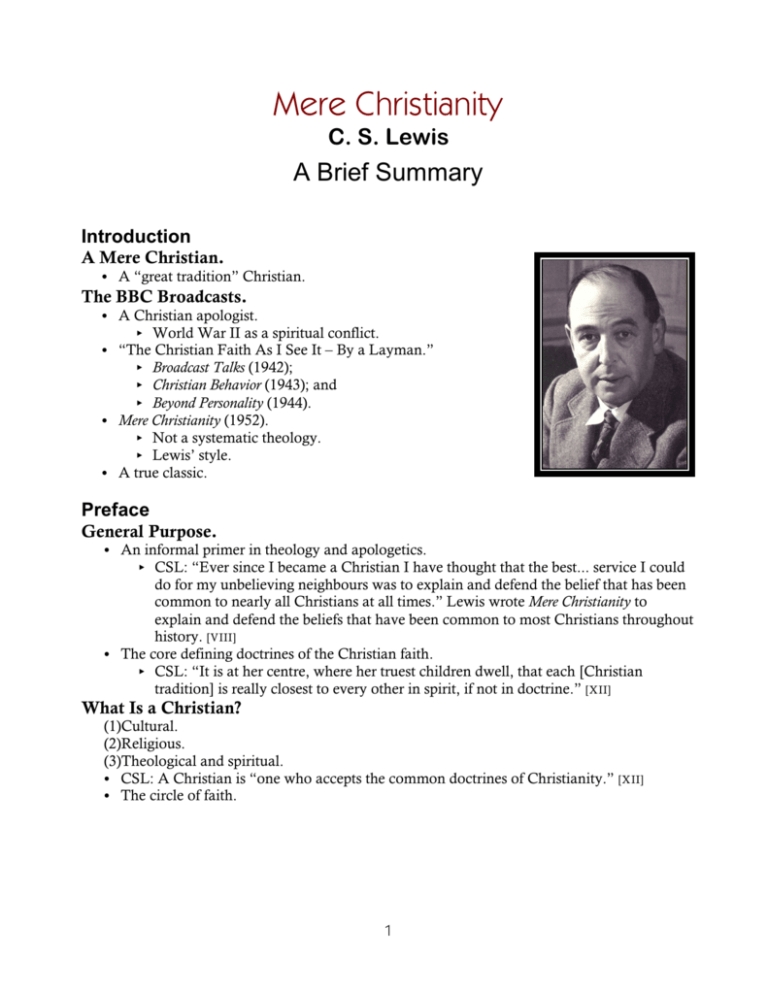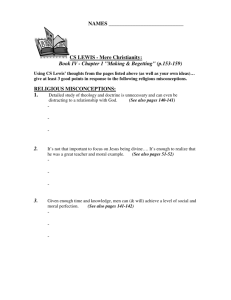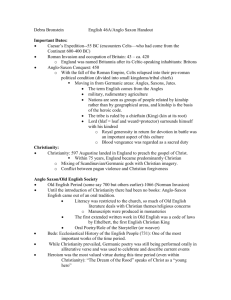Mere Christianity: C.S. Lewis Summary & Key Concepts
advertisement

Mere Christianity C. S. Lewis A Brief Summary Introduction A Mere Christian. C A “great tradition” Christian. The BBC Broadcasts. C A Christian apologist. < World War II as a spiritual conflict. C “The Christian Faith As I See It – By a Layman.” < Broadcast Talks (1942); < Christian Behavior (1943); and < Beyond Personality (1944). C Mere Christianity (1952). < Not a systematic theology. < Lewis’ style. C A true classic. Preface General Purpose. C An informal primer in theology and apologetics. < CSL: “Ever since I became a Christian I have thought that the best... service I could do for my unbelieving neighbours was to explain and defend the belief that has been common to nearly all Christians at all times.” Lewis wrote Mere Christianity to explain and defend the beliefs that have been common to most Christians throughout history. [VIII] C The core defining doctrines of the Christian faith. < CSL: “It is at her centre, where her truest children dwell, that each [Christian tradition] is really closest to every other in spirit, if not in doctrine.” [XII] What Is a Christian? (1)Cultural. (2)Religious. (3)Theological and spiritual. C CSL: A Christian is “one who accepts the common doctrines of Christianity.” [XII] C The circle of faith. 1 Mere Christianity: A Brief Survey 2 BOOK I Right and Wrong as a Clue to The Meaning of the Universe Thesis: The Moral Law. Main Points. C There is a Law of Human Nature (i.e., “Natural Law”) that is universal and absolute. C The moral realities: (1)There is a universal moral law • The concept of Natural (Moral) Law. • The Dao (“The Way”). (2)None of us keeps this Law consistently. C CSL: “These two facts are the foundation of all clear thinking about ourselves and the universe we live in.” [8] C This Natural (Moral) Law transcends culture. < The difference between impulses and the Moral Law. < Rom. 1:16-32; 2:5-16. C Is the Moral Law a social convention? < CSL: “The moment you say that one set of moral ideas can be better than another, you are measuring them both by a standard, saying that one of them conforms to that standard more nearly than the other. But the standard that measures two things is something different from either. You are, in fact, comparing them both with some Real Morality, admitting that there is such a thing as a real Right, independent of what people think.” [13] < CSL: Do not think... that I am yet a hundred miles of God of Christian theology. All I have got to is a Something that is directing the universe, and which appears to me as a law urging me to do right and making me feel responsible and uncomfortable when I do wrong.” [25] C Is the Absolute Unifying Force of the Universe personal or impersonal? C Is belief in God tantamount to “turning the clock back?” < Real progress. C There is Somebody or Something behind the Moral Law. C How can we know something about the Creator? (1)Evidence based on the universe. (2)Evidence based on the Moral Law. C A logical summa: (1)A good Being created this exquisitely beautiful world. (2)The world is fouled up. (3)Only the Bible offers a plausible solution. C Does Christianity make sense? < CSL: “I agree that the Christian religion is, in the long run, a thing of great comfort. But it does not begin in comfort; it begins in dismay.” Mere Christianity: A Brief Survey 3 BOOK II What Christians Believe Thesis: The Moral Law. Main Points. C The problem of atheism. C The problem of pantheism. C The problem of dualism (Manichaeanism). C Chapter 3 – “The Shocking Alternative.” C The issue of free will. C The key to history. C God’s redemptive work. (1)The human conscience. (2)“Good dreams.” (3)God’s self-revelation in Hebrew/Jewish history. (4)“The real shock.” • CSL: “Among these Jews there suddenly turns up a man who goes about talking as if he was God. He claims to forgive sins. He says he has always existed. He says he is coming to judge the world at the end of time... what this man said was, quite simply, the most shocking thing that has ever been uttered by human lips.” “By claiming to forgive sins, he implies that he is the one against whom we have committed those sins... This makes sense only if he really was the God whose laws are broken....” In addition, Christ describes himself as “humble and meek” – the very last characteristics we would attribute to someone making these claims. [51] C The Great Trilemma. < CSL: “I am trying here to prevent anyone saying the really foolish thing that people often say about him: ‘I’m ready to accept Jesus as a great moral teacher, but I don’t accept his claim to be God.’ That is the one thing we must not say. A man who was merely a man and said the sort of things Jesus said would not be a great moral teacher. He would either be a lunatic – on the level with the man who says he is a poached egg – or else he would be the Devil of Hell. “You must make your choice. Either this man was, and is, the Son of God: or else a madman or something worse. You can shut him up for a fool, you can spit at him and kill him as a demon; or you can fall at his feet and call him Lord and God. But let us not come with any patronizing nonsense about his being a great human teacher. He has not left that open to us. He did not intend to.” [52] C A fourth alternative. C What is mere (basic) Christianity? < Christ died for us, and his death cleanses us of our sins. < By his resurrection, he triumphed over death. < CSL: “That is Christianity. That is what has to be believed.” [55]






